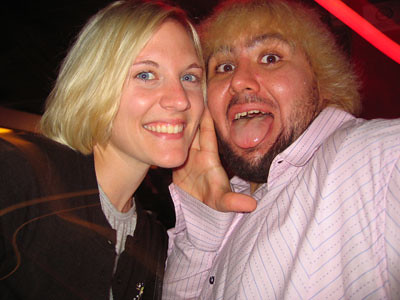Elle est avec stupide

Je'taime
Physically, aspergians are no different from non-autistics. The difference lies in the social life. Most people are able to gather a whole host of information about other people's cognitive and emotional states based on clues gleaned from the environment and the other person's body language. The individual with Asperger's can be every bit as "mind-blind" as the person with profound classical autism - they may, at best, see a smile but not know what it means (perhaps overwhelmed with the possibilities -- is it an understanding, a condescending, or a malicious smile?) and at worst they will not even see the smile, frown, smirk, or any other nuance of interpersonal communication. They generally find it difficult or impossible to "read between the lines"; that is, figure out those things a person is implying but is not saying directly -- not because they can't imagine the answer, but because they are unable to choose among the possibilities.
Asperger's syndrome can involve an intense and obsessive level of focus on things of interest and is often characterized by special (and possibly peculiar) gifts. Particularly common interests are means of transport (for example trains), computers, and dinosaurs. These interests are often coupled with an unusually high capacity to retain and recall encyclopedic amounts of information about the favored subject. In general, orderly things have appeal to individuals with Asperger's. In pursuit of these interests, the individual with Asperger's often manifests extremely sophisticated reason, an almost obsessive focus, and eidetic memory.
Individuals with Asperger's have emotional responses as strong as, or perhaps stronger than, most people, though what generates an emotional response might not always be the same. What they lack (or are markedly slower to develop) is the inborn ability to perceive the emotional states of others or to express their own emotional state via body language, facial expression, and nuance in the way that most people do. Many people with Asperger's report a feeling of being unwillingly detached from the world around them; they lack the natural ability to see the subtexts of social interaction, and they equally lack the ability to broadcast their own emotional state to the world accurately.
Those affected by Asperger's may also manifest a range of other sensory, developmental, and physiological anomalies. It is common for Asperger's children to evidence a marked delay in the development of fine motor skills. They may display a distinctive 'waddling' or 'mincing' gait when they walk and may walk with their arms held out in an unusual manner. Compulsive finger, hand, or arm movements, such as flapping, are also observed.
Some Asperger's children suffer from varying degrees of sensory overload, and may be pathologically sensitive to loud noises or strong smells and may dislike being touched.
As with most gifted children, children with Aspergers are often misdiagnosed by teachers as being a "problem child" or a "poor performer," but the reality is that they simply have an extremely low tolerance and motivation for what they perceive to be mundane and mediocre tasks, and will often rather daydream within their own focused universe than work on the task at hand.
from wikipedia




0 Comments:
Post a Comment
<< Home